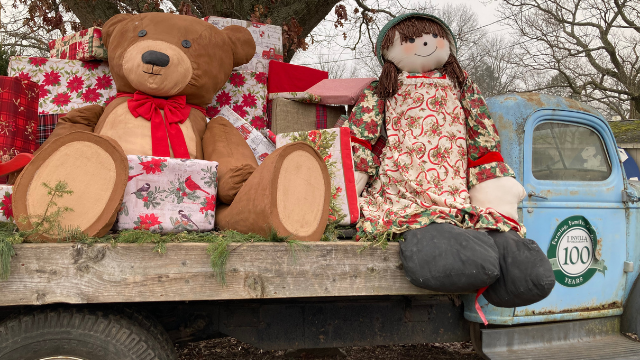
Ten years ago, a non-profit child welfare organization ran a program called Family School that worked with parents at risk of losing custody of their children for neglect and abuse. One of the most wonderful field trips they organized each fall was a hayride and apple picking excursion at Linvilla Orchards. This simple but grounding visit brought families together, helping to rebuild a sense of connection between generations.
The Linvill family are Quakers who have worked for generations to make the story of how we grow and harvest foods more accessible to people who rarely interact with farmers. Their winter programs at Linvilla Farm include public displays of ice carving, Santa drives (behind a green John Deer tractor with antlers), hayrides, bonfires and other experiences. There is a market with fresh produce and a nursery as well.
The family home (pictured above) still stands adjacent to a memorial tree that tells the family’s story. There is also a small sign explaining the farm’s history.
At this time of year, the big draw is a hayride with a cut your own tree activity. Participating families hop on the hayride to tree plantings to choose a perfect Christmas tree for their home. Saws are provided.
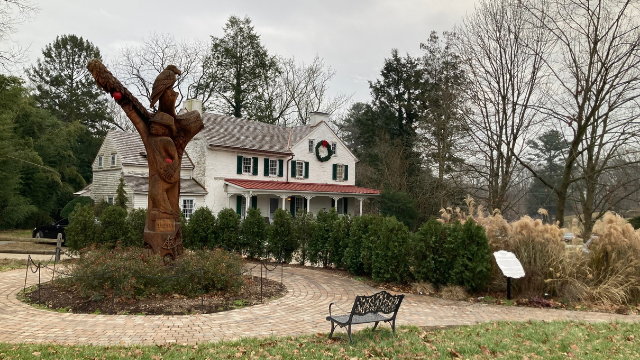
Your farming business is more than 100 years old. It is part of family entertainment, event site, farmer’s market, and educational experience. How did you begin, and how does the family manage it all today?
In 1914, Arthur Linvill and his mother Lydia purchased a dairy farm with an eighty-foot tall octagonal barn. Arthur and his mother delivered fresh milk and cream to Swarthmore by horse and buggy, but Arthur wanted to grow fruit. Arthur planted orchards and then sold the fruit from a horse-drawn wagon. With the increased use of automobiles, people started coming to the farm where the Linvill family sold their produce from the front porch of the farmhouse.
Eventually, the farm market was established in the octagonal barn. In the 1960s, the farm began doing school tours and in the 1970’s Pick Your Own fruits and vegetables. This was the beginning of Linvilla introducing the concept of “agri-entertainment.”
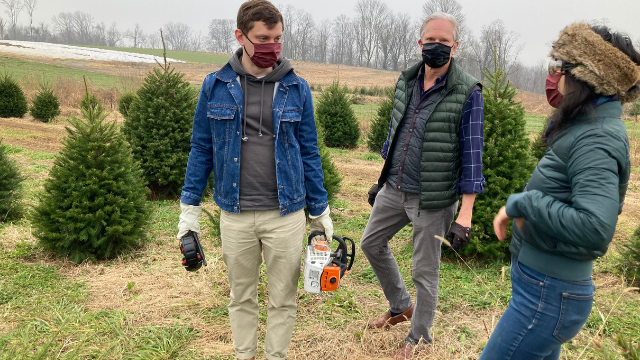
With approximately 50 full-time employees and another 250 seasonal employees, management extends beyond the family. We are blessed to have an amazing, dedicated staff and management team. And as is typical of many family-run businesses, we are frequently “all hands, on deck” in terms of family participation.
How does being Quaker impact your business outlook? Are they connected? How do you maintain both faith and the farm at a time when the world is changing so quickly?
Being Quaker guides all things in our lives, so yes, it does impact our business outlook. Linvilla Orchards is run in the manner of Friends. All major business decisions are made by consensus by the four Linvill siblings, who act as the Board of the business. The Linvill children were raised by devout Quakers, Peg and Paul Linvill, and their family life and business are fundamentally guided by these principles.
The Quaker process has proven to be frustrating to the non-Quaker management team on occasion due to the time that is sometimes required for discernment, but the family is committed to the process. There is great appreciation amongst the staff for the many other aspects of Quakerism they experience, like integrity, belief that there is that of God in each person, fairness, and equality, to name a few.
Having Quakerism so fundamentally infused in our lives makes it a natural extension in our business. It is a balance addressing the needs of a growing business and demands from a growing population while still prioritizing simplicity.
What is it like to wake up in the morning on Linvilla Farm? How many family members are involved, and how does the corporate structure support the vision of the family?
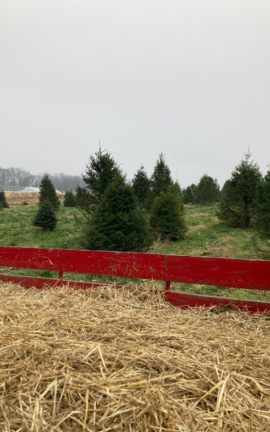
There are the four Linvill siblings: Sue, Steve, Nancy, and Jean, who work almost every day. Additionally, one spouse is a full-time employee and the other three work in various capacities (driving hayrides, parking cars, and managing people) during the busy season. We are now enjoying the next generation participating in the family business. One grandson has returned to the farm after college, and another four grandchildren are working during summer and college breaks. The youngest of the grandkids are two in high school who also work when their schedules allow.
You were farmers first and an event site later. When did the transition happen?
In 1971, Peg Linvill created a Harvest display that won first place in the Philadelphia Horticulture Society’s Harvest show. That display was brought back to the farm and was the beginning of Pumpkinland. The farm started the Pick-Your-Own fruit business at the same time. During the ’70s, people would pick volumes of fruit for canning and preserving.
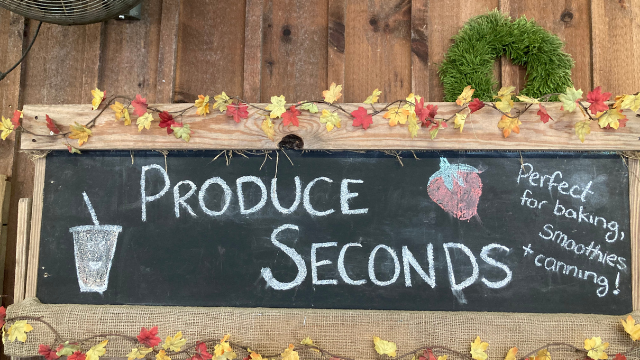
Later, as consumers began to move away from canning and preserving fruits and veggies, pick-your-own became more about the experience of the activity rather than saving money and buying in volume. As this shift in consumerism began, the farm began to host summer festivals focused on the fruits in season. The festivals would highlight the fruit, educate consumers, and market our crops.
How did you come to build the diversity of produce, the orchard, pumpkin patch, Christmas tree fields, and the multitude of experiences that is Linvilla? Were the experiences driven by the need to bring farming to the community, or were they driven by the products that you sell?
We have always stayed committed to growing fruits and vegetables. There is a little diversity of crops based on the inclination of the farm manager and regional demands. The development of the Cut-Your-
Own Christmas tree business was in-part in response to the desire to extend our season until after the Christmas holiday. We always sold pre-cut Christmas trees, greens, and wreaths as well as fruit baskets, but the addition of the CYO trees added to our December business and at the same time was useful for soil conservation and other environmental benefits.
What are you trying to share with the community through the experiences that visitors have when they come to Linvilla? Does being Quaker play a role in that?
Sadly, there is a profound lack of understanding about where food comes from. It is our hope that we can continue to educate the public and provide opportunities for urban and suburban families to enjoy open space and the beauty of the farm. We hope that through education and exposure to the farm, we can encourage a greater stewardship of our Earth.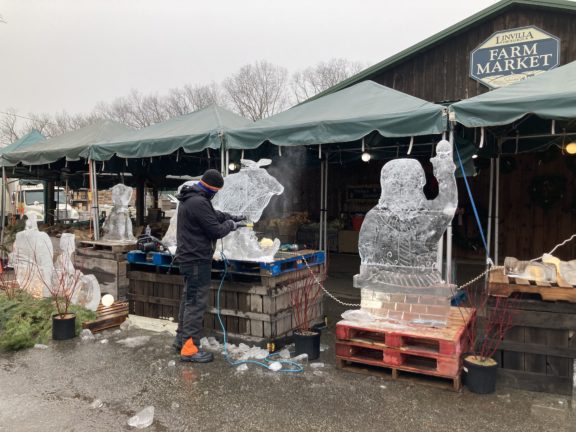
How has Covid impacted you? How hard is it to run this kind of business in these times?
It has been very difficult for everyone during the pandemic. We are considered an essential business because we sell food, so we did not close at all this year. We were able to alter our operations and provide curbside pick-up and delivery services to those in need, and this was very gratifying for us.
We were the lifeline to many who were unable to leave their homes.
We were incredibly nervous about the health and well-being of our employees as well as our customers. Putting precautionary measures in place – like plastic barriers, barricades, and additional cleaning and disinfecting materials proved to be very expensive, but, of course, were imperative.
Our biggest challenge came during our traditional fall busy season. Not having a designated entrance or turnstile means we have no real way to control visitors to the farm – short of closing. We purchased a timed ticketing software package for our activities in hopes of spreading visitors throughout the day, but our popular season coincided with the relaxing of government restrictions, and MANY people came to the farm to just be outside!
We found ourselves in the position of monitoring mask-wearing and social distancing as well as the management of our business. We take our responsibility for the safety of our employees, our customers, and our family very seriously, so we were burdened by the multitude of pandemic related decisions and the profound impact of each.